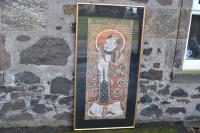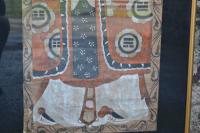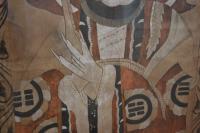Yao Taoist God Painting of Lingbao Tianzun or Shangqing, One of the Three Pure Ones, China or Vietnam, c. 1890
Age:
Circa 1890
Material:
Painting On Mulberry Paper
Dimensions:
Frame: 71.5cm x 139.5cm
Shipping:
Standard Parcel
Price:
SOLD
Lingbao Tianzun, also known in English as the Heavenly Lord of Spiritual Treasures, is a Taoist god. Also known as Shangqing, he is the second of the Three Pure Ones (Sanqing) who head the Yao Taoist pantheon. According to Taoist beliefs, the Three Pure Ones were brought into existence through the interaction of yin and yang. They are respectively Yuqing, ‘The Jade Purity‘, Shangqing, ‘The Supreme Purity‘, and Taiqing, ‘The Grand Purity‘. Lingbao Tianzun represents the second phase of Creation where the Yang was separated from the Yin and the Law of Things was ordered into place.
He holds a Ruyi representing authority and on his robe are the Eight Trigrams or Bagua. Each of the Eight Trigrams consists of three horizontal lines that represent either yin or yang energy. Yang energy is depicted as a continuous line and yin energy by a broken line. The lowest line represents the earth, the centre humanity and the top, heaven. Each trigram is associated with a season, time of day, and element (water, fire, heaven, earth, etc.). Lingbao Tianzun is depicted with a third eye in the centre of his forehead, one of the main energy centers forming a part of the main meridian that separates left and right hemispheres of the body.
The painting is on mulberry paper using natural pigments. It has minor creasing and a small area of damage to the bottom left-hand corner, but otherwise is in very good condition. It retains its original hanging rope to the top and has been mounted on black fabric within a modern gilt frame.
The Yao people are one of the oldest ethnic groups in China, residing in the Guangxi, Hunan and surrounding southern provinces of China. Over time they have moved into northern Vietnam (where they are called Dao), northern Laos and Myanmar. The Yao, unlike their ethnic neighbours, are strongly Taoist and Taoist rituals and beliefs define community life. All Yao adult males are initiated to some degree into the Taoist clergy. They combine this with pre-Taoisation animistic beliefs, shamanism and ancestor worship. In 1904, a reform policy of the late Qing dynasty provided that schools would be built through the confiscation of temple property. "Anti-superstition" campaigns followed. The Nationalist government of the Republic of China intensified the suppression of the ancient Chinese religion with the 1928 "Standards for retaining or abolishing gods and shrines"; the policy attempted to abolish the cults of all gods with the exception of ancient great human heroes and sages such as Yu the Great, Guan Yu and Confucius.








